Foreign Language chair Mark Johnson won the Best Picture Academy Award for Barry Levinson’s poignant 1988 drama Rain Man. It was one of several films Johnson made with Levinson during a 12 year span, and it won four Oscars, including one to Dustin Hoffman as Best Actor, and also captured a Golden Globe for Best Picture.
Born in Maryland, Johnson spent 10 years of his youth in Spain. He earned his undergraduate degree in drama from the University of Virginia and his M.A. in Film Scholarship from the University of Iowa. From there, he moved to New York and entered the Director’s Guild Assistant Director Training Program.
In his successful partnership with Barry Levinson, Johnson produced all of the writer-director’s films from 1982-1994. In addition to Rain Man, their acclaimed features includes Good Morning Vietnam, The Natural, Tin Men, Toys, Young Sherlock Holmes, Avalon, Diner (their 1982 debut project, for which Levinson earned an Oscar nomination for his screenplay), and Bugsy, nominated for ten Academy Awards, including Best Picture and Best Director. Bugsy also captured a Best Picture Golden Globe Award.
features includes Good Morning Vietnam, The Natural, Tin Men, Toys, Young Sherlock Holmes, Avalon, Diner (their 1982 debut project, for which Levinson earned an Oscar nomination for his screenplay), and Bugsy, nominated for ten Academy Awards, including Best Picture and Best Director. Bugsy also captured a Best Picture Golden Globe Award.
Bijan Tehrani: What was the very first time that a foreign movie, a foreign language movie, was nominated and mentioned in the Academy Awards?
 Mark Johnson: Of course I wasn’t around then—but I understand the first time that a foreign language film received an award, an honorary award, was the Vittorio De Sica’s film Shoeshine in 1947. The foreign language film award category had not been established yet; it was offered 9 years later, in 1956.
Mark Johnson: Of course I wasn’t around then—but I understand the first time that a foreign language film received an award, an honorary award, was the Vittorio De Sica’s film Shoeshine in 1947. The foreign language film award category had not been established yet; it was offered 9 years later, in 1956.
BT: Why was this award created and is there any background on that?
MJ: Well you know, once again I wasn’t there, but I understand that there were a number of people on the board of governors who thought it was time that there be a foreign language Oscar, and part of it at that time of course had to do with the growing success of foreign language films at the art cinemas in America. So obviously that still pre-dates the French new wave, but there were film makers who were French, Italian, and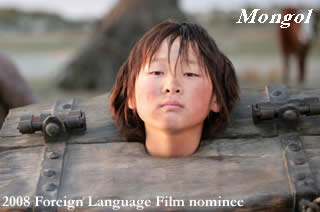 Swedish who were then having success in the U.S. and I’m not sure who spearheaded that movement, but it clearly was influential.
Swedish who were then having success in the U.S. and I’m not sure who spearheaded that movement, but it clearly was influential.
BT: And what was the first film that won that award?
MJ: The first film that actually won the best foreign language film award was Fellini’s La Strada in 1956
BT: What is the process of selection and nomination for the Foreign Language Film award?
MJ: Well the academy invites every country in the world to submit what it considers its best film of the year. Now, we would hope that every country—every filmmaking country—had some sort of body that could make that decision; you know, something equivalent to our academy, and in many countries too—for instance in Spain—there is a film academy which selects a film every year to represent the country at the 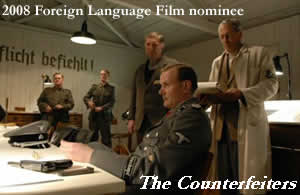 Oscars. In some countries like in Israel, the movie that wins their equivalent of the Oscar automatically goes as the Israeli entry. Anyhow, every country is invited to submit a film. This year, 63 countries responded and then all 63 of those films are screened at the Samuel Golden Theatre at the academy. Every member of the academy is invited to participate. The trick is that they have to see a certain number of films to have their votes qualify and it involves a lot of time, obviously 63 films is pretty daunting. We start off with a membership of about 400 people, and then not everybody qualifies because some of them are in the middle of working on a film or they go on location or they find it difficult just to get to the academy and, you know, to be able to see a double feature—which we do a lot. For instance, tonight I’m going to see the film from Bosnia and Herzegovina and the film from the Philippines. So, I’ll start at around 7:30 and I’ll get out at around 11:30. We all vote on those films and then we are presented with a short list of 9 films. Those 9 films that we see are made up from the films which received the highest marks from the 63, and then
Oscars. In some countries like in Israel, the movie that wins their equivalent of the Oscar automatically goes as the Israeli entry. Anyhow, every country is invited to submit a film. This year, 63 countries responded and then all 63 of those films are screened at the Samuel Golden Theatre at the academy. Every member of the academy is invited to participate. The trick is that they have to see a certain number of films to have their votes qualify and it involves a lot of time, obviously 63 films is pretty daunting. We start off with a membership of about 400 people, and then not everybody qualifies because some of them are in the middle of working on a film or they go on location or they find it difficult just to get to the academy and, you know, to be able to see a double feature—which we do a lot. For instance, tonight I’m going to see the film from Bosnia and Herzegovina and the film from the Philippines. So, I’ll start at around 7:30 and I’ll get out at around 11:30. We all vote on those films and then we are presented with a short list of 9 films. Those 9 films that we see are made up from the films which received the highest marks from the 63, and then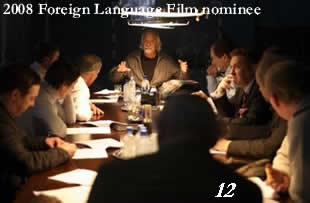 we have another committee, a sub-committee made up of 30 people—20 in Los Angeles, 10 in New York in which the members see 3 movies a day and comes up with the 5 nominees for best foreign language film of the year. And then every member of the academy is invited to vote on the best picture. The trick is that they have to see all 5 of them and they can’t see them on DVD, they have to see them on film, which is a rule that is a difficult one to pull off, but I’m also very proud of it. We are asked to see those films the way the filmmakers want them to be seen. So that’s how we come up with the best foreign language film of the year.
we have another committee, a sub-committee made up of 30 people—20 in Los Angeles, 10 in New York in which the members see 3 movies a day and comes up with the 5 nominees for best foreign language film of the year. And then every member of the academy is invited to vote on the best picture. The trick is that they have to see all 5 of them and they can’t see them on DVD, they have to see them on film, which is a rule that is a difficult one to pull off, but I’m also very proud of it. We are asked to see those films the way the filmmakers want them to be seen. So that’s how we come up with the best foreign language film of the year.
BT: There are a few arguments against limiting the number of films that countries can send. France, for example, could easily send more than 5 films for Foreign Language Film Award this year, but had to choose one film only.
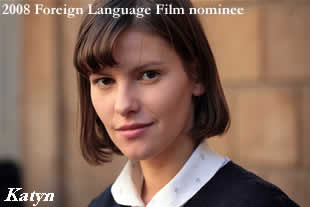 MJ: You know, you can argue that they could have sent La Vie en Rose, or they could have sent The Diving Bell and the Butterfly. The hard part is that, yes, that’s true; and the French have argued over the years regarding why they are limited to one film when they make a lot of films. In any one year, they could have several films they’d want to submit whereas a country like Ecuador only makes 2 or 3 films. I don’t know what they actually make, but yet, they are allowed to have the same number. The truth is, how do you limit that? Say that every country could submit as many as they want? Or do you say, “OK, you get a certain number of films depending on the number of films that country produced.”? On top of that, the problem is just, quite frankly, the workload. I don’t know how any jury could see the number of films we are seeing right now. At some point, it just becomes physically impossible. So that if people said why doesn’t each country submit a film and all the films that win major film festival awards should be wild card entries, all of a sudden you end up with 70, 80, 90 movies which, quite frankly, is just impossible for us to see. We require that these films all be seen on film pretty much by the same people, so the yard stick to measure them is the same. It’s hard to
MJ: You know, you can argue that they could have sent La Vie en Rose, or they could have sent The Diving Bell and the Butterfly. The hard part is that, yes, that’s true; and the French have argued over the years regarding why they are limited to one film when they make a lot of films. In any one year, they could have several films they’d want to submit whereas a country like Ecuador only makes 2 or 3 films. I don’t know what they actually make, but yet, they are allowed to have the same number. The truth is, how do you limit that? Say that every country could submit as many as they want? Or do you say, “OK, you get a certain number of films depending on the number of films that country produced.”? On top of that, the problem is just, quite frankly, the workload. I don’t know how any jury could see the number of films we are seeing right now. At some point, it just becomes physically impossible. So that if people said why doesn’t each country submit a film and all the films that win major film festival awards should be wild card entries, all of a sudden you end up with 70, 80, 90 movies which, quite frankly, is just impossible for us to see. We require that these films all be seen on film pretty much by the same people, so the yard stick to measure them is the same. It’s hard to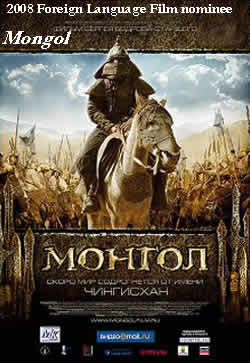 use an art form and a sports analogy, but it actually makes sense when you consider The World Cup. Each country is invited to submit a team made up of its citizens – its Soccer playing citizens. Now Brazil could submit 3 or 4 teams, but those are the rules and somehow it works; it’s far from a perfect system. I understand the criticisms and every year we go through and try and figure out how to make it better, but there is a point where you can’t deal with so many movies.
use an art form and a sports analogy, but it actually makes sense when you consider The World Cup. Each country is invited to submit a team made up of its citizens – its Soccer playing citizens. Now Brazil could submit 3 or 4 teams, but those are the rules and somehow it works; it’s far from a perfect system. I understand the criticisms and every year we go through and try and figure out how to make it better, but there is a point where you can’t deal with so many movies.
BT: True, 63 films are a lot to see. That is why Academy members may never get a chance to see all these films. Actually not all the filmmakers have the resources to arrange enough screening sessions for their films in orders for them to be seen by Academy members.
MJ: Yes, I know, and it’s hard. I’m in the middle of producing a number of movies and I’ll produce 2, 3 or 4 movies this year, and so it’s really hard for me to make that time, and yet, I insist on doing it. It’s too important to me; it’s a responsibility that I love doing.
BT: Do you think giving Best Foreign Language Film award to an American film, just because it’s made in language other than English, is justified. For example, films such as Letters to Iwo Jima have won the Foreign Language Film Award in US.
MJ: Yeah, but you know that criticism is for the Hollywood Foreign press. We didn’t accept those movies. The Clint Eastwood movies are American movies. You could argue that an American film could conceivably be in the race for best foreign language film. So that if an American filmmaker made a movie in the Indian Language or even in Spanish, it could conceivably be in contention, but you know, who would nominate it? Would that then be the academy? And the academy is not going to nominate a film for its own competition that would not be fair.
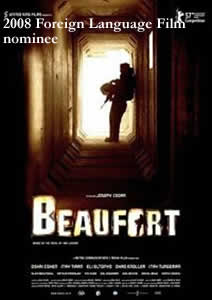 BT: How much do you think winning the Best Foreign Film Award helps the filmmaker of the chosen picture in creating new films?
BT: How much do you think winning the Best Foreign Film Award helps the filmmaker of the chosen picture in creating new films?
MJ: Well it’s interesting. The one thing that gives me a lot of pleasure every year is discovering from the filmmakers how incredibly important the foreign language Oscar is. The Oscar is universal, people know it everywhere, and it brings personal pride obviously to the filmmakers and often real national pride and it also focuses on national cinema. I hear time-and-time-again that it actually helps the film industry in that country, because of the pride that an Oscar nomination or Oscar win will represent, and I’ve heard it from a number of Mexican filmmakers that it helped the government consider injecting funds into the motion picture industry. For instance, when Tsotsi won from South Africa, there was a parade in Johannesburg with the director and a celebration for it. It’s a big event that draws a lot of attention to the national filmmakers. In the US of course, I know it helps; I can quantify it.I don’t know what it does in terms of the box office, but I know it clearly helps.
BT: Which country and which filmmakers have won the most of Foreign Language Film awards?
MJ: The country that has won the most Foreign Language film awards is Italy. It has won 10. It’s had some special awards, some honorary awards, but it has won 10 in this competition, followed by France with 9 wins and Spain with 4. Germany must be right behind. I would guess they had 4. And the filmmaker that’s won the most is Fellini; he won 4. Ingmar Bergman won 3 and Vittorio De Sica won 2.

